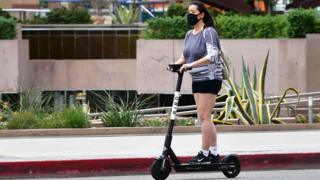E-scooters’ UK speed limit ‘shocks’ blindness charity

Image copyright
AFP
E-scooters are a common sight in cities like LA – but are illegal in the UK until the weekend
The UK’s blindness charity says e-scooters remain a “real and genuine threat” ahead of their legalisation.
The Royal National Institute of Blind People (RNIB) said that the government’s safeguards, announced this week, had failed to assuage its fears.
Other witnesses at a parliamentary transport committee hearing said the top speed and weight of the e-scooters were higher than they should be.
It will become legal to ride e-scooters on Great Britain’s roads from Saturday.
The change, which comes amid pressure on the public transport system from social distancing requirements, applies only to rentals. Private scooters will remain illegal.
Earlier this week, the government revealed that the speed limit would be 15.5mph (25km/h), and that users would need a driving licence to take part.
Eleanor Southwood, chair of the RNIB board, told the committee: “It’s really clear that even with all of the safeguards… we do consider e-scooters to be a real and genuine threat to the ability of blind and partially sighted people to move around independently and safely.”
She said the RNIB was “really surprised to see the 15mph speed limit yesterday, which is a lot faster than we had anticipated”.
- When can I ride an e-scooter legally?
- Why some fear change to e-scooter laws
Electric scooters are much quieter than cars, she said. And she added that evidence of pedal bikes being used on pavements suggested that “without robust enforcement”, e-scooters would probably be used on pedestrian walkways.
Undocked e-scooters left on the street could also be a trip hazard.
“We were hoping that speeds would be limited, ideally to as close to walking as possible, but if not, to an absolute maximum of 12.5mph,” Ms Southwood said.
“So we are really shocked by the speed limit.”
Weight, speed, power
Philip Darnton, director of the Bicycle Association, told politicians his group had no set view on e-scooters, because some of its members were fiercely against them while others sold them.
But he said that the power and weight allowed by the government went far beyond what was expected.
“The power, again, was very surprising – 500 watts,” he said, referring to the motor.
“Most scooters in the world, and all the most popular brands are rated up to 250 watts. 500 watts will give you formidable acceleration, much, much faster than any cyclist or e-bike – which is also rated at 250 watts – could possibly do.”
That acceleration increased the risk to riders, he said.
He added that the Bicycle Association had recommended a maximum weight of 20kg (44lb). But the government had approved more than twice that – 55kg – to accommodate bigger batteries and lower the cost of constant recharging by the commercial operator.
“The combination of speed, power, and weight has to be looked at,” he warned.
Rachel Lee, of the Living Streets walking group, said she was concerned about the speed – and also about people using them while drunk.
But the broader problem was that “our infrastructure currently is not up to the job”, she said – pointing to a lack of segregated cycleways as an example.
“At the moment I just fear that people who are using these for the first time, are getting scared on our busy roads, and then jumping up on the pavement – and then before you know it someone who’s vulnerable, elderly, maybe can’t see – or even children – are being knocked over.”
Two academics, however, spoke about the potential positive impact e-scooters could have.
“I can see the benefits in terms of environment, and health, and also social inclusion,” Graeme Sherriff from the University of Salford said.
“It depends on the rest of the system in a way, but they could very much encourage people away from cars.”
Jillian Anable, a transport expert from the University of Leeds, echoed the positive sentiments.
“If we can’t do some bold things now, then when can we do them, with respect to the transport sector?” she said.
She also questioned the need for users to have a driving licence.
“Its greatest merit is for those who do not have a driving licence, and don’t aspire to have one,” she said.
